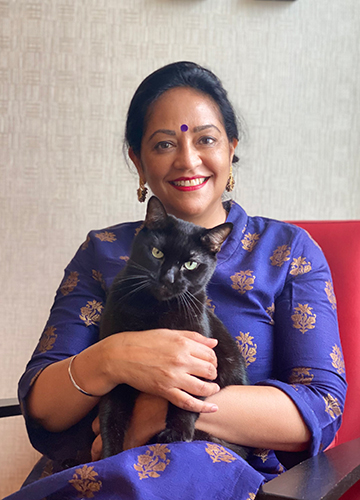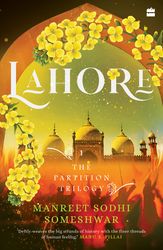The Partition existed like furniture in her home. Manreet Sodhi Someshwar grew up in Ferozepur in Punjab, where both history and geography changed in 1947. It loomed large over the present and the future. “Every house had a Partition story or more,” said Someshwar from her home in the US. “You don’t pay attention to it. It is like the air you breathe. There were tons of stories growing up—it is a part of the furniture.” The rifts of the past—Ferozepur was a Muslim-majority town that changed to Hindu overnight—continued to loom large over the town. Her latest book Lahore, which recreates the last months before Independence, is thrilling, heart-breaking and poignant.
“In my adolescence, 1984 happened,” said Someshwar. “My father was a criminal lawyer. It was like Gulzar’s film Maachis (1996). You have those same scenes playing out. We had TADA [Terrorist and Disruptive Activities (Prevention) Act] at that time. I saw it very closely. Curfews, schools suspended, colleges suspended. At that time in our town, the consensus was that it was 1947 all over again. Since then, I wanted to know how and why Partition and this spiral happened, and we never seem to break it.”
Someshwar managed to escape the town, but never the questions of the past. In 2000, she took a break from her corporate career living in spotless Singapore, where she chose to write.
Lahore is an attempt to understand the present through the prism of life-altering, geography-changing, history-making events. Someshwar spent 20 years trawling through libraries, living with the characters in her head and trying to understand their roles. “I read about Jawaharlal Nehru, Lord Mountbatten, and Vallabhbhai Patel,” she said. “My daughter, who is 19 now, would joke, ‘My mother has some very old men as her friends.’ I used to spend my time in the library reading up about them. I have these fat files on ‘Jawahar’. I am saying ‘Jawahar’ because they were my characters—I knew them.”
This book, however, is only the first part of a trilogy. Someshwar has two other books on the cards—Hyderabad and Kashmir, effortlessly blending fact and fiction to make it irresistible and accessible. “It is my town that made me a writer,” she said. “I think after I have done the Partition trilogy, I will say I have paid my dues to the land.”
Lahore begins with a bang and continues to keep you gripped. Paced like a thriller, the book has the sweep of a saga and cuts between Delhi and Lahore to offer the reader a glimpse of the hectic months leading to Independence. She has a vast array of characters—Dickie Mountbatten and his wife Edwina, Nehru, Patel, and his daughter Mani. Then, there are ordinary ‘Lauris’, fictional but feeling real, who bore the weight of Partition—Beli Ram and Mehmood, friends who grew up together and find the charged atmosphere spilling into their relationships. Kishan Singh and his three daughters, Malik, a sepoy, and his love, Tara.
Unputdownable, the book is littered with tiny details that are painstaking work to create a vivid portrayal of those last few months—bringing the drama alive. Someshwar also carefully chronicles the madness that began before the Partition—the divisiveness—that continues even till today. “It is one thing to do research, but you have to craft it into a narrative that is as honest, and as truthful, but it also has to be a story that people will read,” she said. “With Lahore, time itself was a thriller. We are all just hurtling towards August 15. I was trying to capture that in the narrative in the way that it moves. The situation is just so inflammable. I wrote it breathlessly in four months.”
Going beyond the violence, what Someshwar’s Lahore does is explore the complexity of the situation. “I would like to say we in India say, Partition was like the Holocaust,” she said. “It was to a very large extent. But it wasn’t either. In the Holocaust, it was very clear who was the enemy. You knew who the bad guy was. The idea of Partition came out from the Gangetic plains, but where it got implemented was in Bengal and in Punjab, which benefited enormously from the shared way of life.
“I can speak for Punjab, where people were living just as Punjabis. A Malik could be a Hindu, a Sikh, or a Muslim. The shared culture was so strong and the fact that Sikhism arose as a bridge between Hinduism and Islam—that is the handshake between those two. So, overnight you go and say this will run through this land. How do I know where the line is?”
This is a story not tinged with bitterness, but regret and with the dream of Punjab—bound by a common culture, of the poetry of Bulleh Shah of Heer—at its heart. Borders do not have to be boundaries.
Lahore: The Partition Trilogy
By Manreet Sodhi Someshwar
Published by HarperCollins
Price Rs499; pages 328



